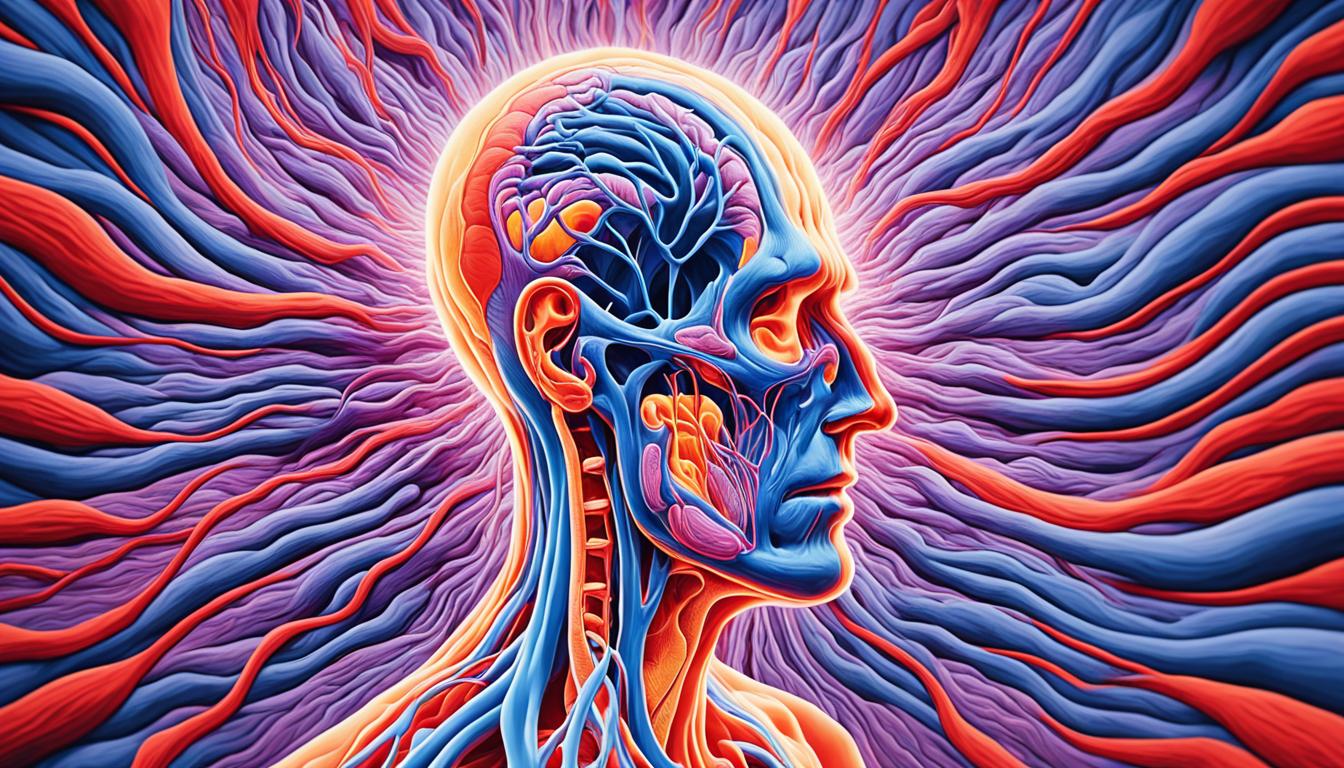Giant cell arteritis, also called temporal arteritis or GCA, is when the arteries’ linings get inflamed. This mainly happens in the head, near the temples. The inflammation causes various symptoms and problems. Quick diagnosis and treatment are key.
Symptoms include bad head pain, scalp that feels sore, jaw pain, and feeling feverish. You might also feel very tired or lose weight without trying. Some people have trouble with their vision, like seeing double or losing vision suddenly. It’s important to know these signs and get help to avoid worse issues.
The exact cause of GCA is still a mystery. Yet, it’s thought to happen when the immune system wrongly attacks artery walls. Things like your genes or where you live might also up the risk of getting it. Being older, a woman, and having a certain history of health problems can make it more likely for you.
Not treating GCA can lead to serious problems like losing your sight, a growing weak spot in the main artery from your heart, or a stroke. Finding it early is vital to stop these things.
Doctors find GCA by looking at your symptoms, checking you over, and often doing a biopsy. This test involves taking a small piece of tissue from a temporal artery to see if there’s a problem. Getting the right diagnosis helps plan the best way to treat you.
The main focus of treating GCA is to lessen its symptoms and stop vision loss. People are usually given a lot of corticosteroids. There are also drugs that help your body stop reacting so strongly, meaning you might not need as much of the other medicine. Taking care of yourself with good food, staying active, getting enough sleep, and following your doctor’s orders is also a big part of treating GCA.
It’s good to see your doctor often while you’re being treated. This helps them check how you’re doing and look for any new problems, like a weak spot in your heart’s main artery. Scientists are also looking into whether using stem cells might help treat GCA. But there’s still a lot to learn about how well it could work or how safe it is.
KEY TAKEAWAYS:
- Giant cell arteritis is an inflammatory disease that affects the arteries, particularly those in the head.
- Symptoms include severe head pain, jaw pain, fever, fatigue, and vision problems.
- Exact causes are unknown, but immune system abnormalities and genetic/environmental factors may play a role.
- Prompt diagnosis and treatment are crucial to prevent complications such as blindness and stroke.
- Treatment involves corticosteroid medications, immune-suppressing drugs, and self-care measures.
Symptoms and Diagnosis of Giant Cell Arteritis
Giant cell arteritis (GCA) causes severe head pain in the temple area and scalp tenderness. Other signs include jaw pain, fever, fatigue, and weight loss. Early diagnosis is very important because these symptoms can greatly affect your life.
Jaw pain, especially while eating or talking, is a common GCA symptom. GCA might also cause vision problems like double vision or sudden vision loss. These eye issues could be permanent and need quick medical help.
GCA may also show symptoms not related to the head. This includes pain and stiffness in the neck, shoulders, or hips. These can be signs of polymyalgia rheumatica, which can be linked to GCA.
If you have any of these symptoms, see a doctor right away for a proper diagnosis. Diagnosing GCA involves looking at your symptoms, doing a physical exam, and running tests.
A temporal artery biopsy is an important test for diagnosing GCA. It cuts a small piece of tissue from above the ear and tests it under a microscope. This test can confirm if you have GCA by showing abnormal cells in the artery walls.
Getting diagnosed early for GCA is key to starting treatment and managing symptoms. Seeking help when you notice symptoms can avoid complications and better your chances.
| Symptoms | Description |
|---|---|
| Severe head pain | Pain in the temple area |
| Scalp tenderness | Tenderness of the scalp when touched |
| Jaw pain | Pain in the jaw, particularly when chewing or speaking |
| Fever | Elevated body temperature |
| Fatigue | Excessive tiredness and lack of energy |
| Unintended weight loss | Weight loss without trying |
Treatment and Management of Giant Cell Arteritis
Treating giant cell arteritis (GCA) is key to easing symptoms and preventing vision loss. Doctors often prescribe corticosteroid drugs in high doses. These include prednisone or prednisolone. Patients might need to take these for a long time, from months to years. Additionally, drugs that lower the immune system, like methotrexate, might be added. This can help lessen the amount of corticosteroids and their side effects.
Taking care of yourself is also critical when dealing with GCA. It’s vital to eat well, exercise, and get enough sleep. This helps your body fight against the disease. It’s very important to stick to your prescribed medicine schedule. This makes the treatment work better and lowers the risk of problems.
Seeing a doctor regularly is a must. They will check how you’re doing and watch out for any issues. People with GCA have a higher chance of developing aortic aneurysm. This can happen even years after they find out they have GCA. Doctors and loved ones should make sure you get checkups often. This helps catch and treat any problems early.
Stem cell therapy is still being studied for GCA. It’s not yet a standard way to treat the disease. More research is necessary to figure out if this kind of therapy is safe and works well for GCA.

